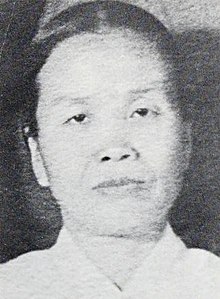Pak Chong-ae | |
|---|---|
 | |
| Vice Chair of the Workers' Party of Korea Central Committee | |
| In office 6 August 1953 – 18 September 1961 Serving with Pak Chang-ok, Kim Il, Pak Yong-bin, Pak Kum-chol, Choe Yong-gon, Chong Il-yong and Kim Chang-man. | |
| Minister of Agriculture | |
| 2nd term | |
| In office October 1961 – 23 October 1962 | |
| Preceded by | Yim Hae |
| Succeeded by | Kim Man-gum |
| Personal details | |
| Born | 1907 North Hamgyong Province, Korean Empire |
| Died | Sometime in or after 1986 |
| Nationality | North Korean |
| Political party | Workers' Party of Korea |
| Other political affiliations | Workers' Party of North Korea |
| Spouse | Kim Yong-bom |
| Children | Pak Sun-hui |
| Awards | International Stalin Prize (1950), Order of the National Flag (1st and 2nd class) |
| Korean name | |
| Chosŏn'gŭl | 박정애 |
| Hancha | 朴正愛[1] |
| Revised Romanization | Bak Jeongae[2] |
| McCune–Reischauer | Pak Chŏng'ae[3] |
Pak Chong-ae (Korean: 박정애;[1] born Ch'oe Vera[4] 1907 – ?[a]), also known as Pak Den-ai,[5] was a North Korean politician.
Pak represented the Workers' Party of North Korea (WPNK) and after 1949 the unified Workers' Party of Korea (WPK).[6] She was already an experienced communist at the time of the liberation of Korea, and she had also studied in the Soviet Union and worked for its intelligence service. She is grouped variously among either the Soviet or the Domestic faction of the party.[7][8]
Pak was the first chairperson of the North Korean Central Committee of the Korean Democratic Women's League, the country's mass organization for women. During her chairwomanship the League had not yet developed into an organization through which the government tightly controls its citizens.
Pak is the only woman to have served in the Politburo of the Workers' Party of Korea until the appointment of Kim Yo Jong. She has been characterized as being the only woman ever to have been truly important in the WPK. Her career in North Korean politics stretched from the 1940s until her purge in 1966 which resulted in her expulsion to countryside. From there on she was allowed to hold minor positions only.
Pak was awarded with the International Stalin Prize in 1950.
- ^ a b Cite error: The named reference
cybe_북한지역was invoked but never defined (see the help page). - ^ Person, James F. (2007–2008). "New Evidence on North Korea in 1956". In Ostermann, Christian F. (ed.). Cold War International History Project Bulletin: Inside China's Cold War. Woodrow Wilson International Center for Scholars. p. 448. GGKEY:18LFSRTZZ8J.
- ^ Cite error: The named reference
Armstrong2013was invoked but never defined (see the help page). - ^ Cite error: The named reference
Lankov2008was invoked but never defined (see the help page). - ^ de Haan 2013, p. 174.
- ^ Wada 2013, p. 28.
- ^ Cite error: The named reference
atim_Asiawas invoked but never defined (see the help page). - ^ Scalapino, Robert A. (1965). The Communist Revolution in Asia: Tactics, Goals, and Achievements. Englewood Cliffs: Prentice-Hall. p. 118. ISBN 9780131530492.
Cite error: There are <ref group=lower-alpha> tags or {{efn}} templates on this page, but the references will not show without a {{reflist|group=lower-alpha}} template or {{notelist}} template (see the help page).